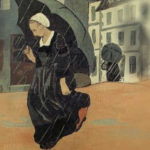We run our website the way we wished the whole internet worked: we provide high quality original content with no ads. We are funded solely by your direct support. Please consider supporting this project.

When God Endorsed Polygamy
We often find God acting as if he supports things we know, by other means, that he does not. For example, though his ideal was monogamy, it’s clear in the biblical narrative that, once God decided to permit men to acquire multiple wives and concubines, he was not above bearing the sin of his people by donning the mask of a deity who actually approves and even celebrates these things. To illustrate, in the course of Nathan chastising David for his affair with Bethsheba and for murdering her husband Uriah, the Lord is depicted as saying through the prophet Nathan:
I gave your master’s house to you, and your master’s wives into your arms. I gave you the house of Israel and Judah. And if all this had been too little, I would have given you even more (2 Sam. 12:8).
Yahweh here wears the mask of the deity who blessed David with multiple wives—indeed, with the wives that once belonged to his “master,” Saul—implying that Yahweh was the one who took them from Saul. Along the same lines, when it was time to announce David’s punishment, the Lord is depicted as saying through Nathan:
Out of your own household I am going to bring calamity on you. Before your very eyes I will take your wives and give them to one who is close to you, and he will sleep with your wives in broad daylight (2 Sam. 12:11).
Stooping to work within the culturally-conditioned and fallen framework of polygamy, and stooping, as well, to work in accordance with the system of immediate rewards and punishments that was the hallmark of God’s covenant with Israel, the Lord is portrayed as the one who was going to curse David by taking his wives and giving them to another man so that they would be raped “before [David’s] eyes” and “in broad daylight.” If we did not know better, these texts would lead us to conclude that Yahweh was a deity who not only had no problem with polygamy, he also had no problem using women as objects to “bless” favored men and to punish wayward men by having them raped in broad daylight!
While the author of this passage clearly embraced this barbaric conception of God, we who enjoy the full and complete revelation of God in Christ should suspect that something else is going on.
With our eyes fixed on Calvary, we must interpret this passage with the same depth perception of faith we have when we confess the crucified Christ to be the definitive Word of God. In this light, we may accept the portrait of God being enraged by David’s heinous sin to be direct revelation, for it is perfectly consistent with the revelation of God in Christ. But the same cannot be said of the violent and misogynistic actions that are attributed to this angry God, for it is simply impossible to imagine Christ causing women to be raped and publicly humiliated as a means of punishing their wayward husband. To this extent, therefore, this text should be understood to reflect the author’s culturally-conditioned, pen-ultimate perspective on God, which the humble God of covenantal love was nevertheless willing to step into as he “breathed” through him.
This does not mean that I deny that these women were tragically raped or that I otherwise assess this narrative to be fictional. I accept that this authoritative narrative intends to be treated as historical. It’s simply that I believe that in light of the cross, we must assess this narrative’s theological interpretation of how God was working through these events to reflect a penultimate perspective of God and to therefore function as an accommodating mask of God, depicting God as approving of activities, and engaging in activities, that he in fact finds repugnant. Yet, precisely as a mask, this narrative’s depiction of God is a shadow of the cross that points to a humble, God of cruciform love who is not above taking on an appearance that mirrors the fallen barbaric state of his people rather than that reflect his true, beautiful nature.
Image by Keoni Cabral via Flickr.
Category: General
Tags: Bible, Cruciform Theology, God
Topics: Interpreting Violent Pictures and Troubling Behaviors
Related Reading

What Bible Translation Do You Recommend?
Greg talks about Bible translations. http://traffic.libsyn.com/askgregboyd/Episode_0051.mp3

Sermon Clip: Spiritual Bodybuilding
In this sermon clip, Greg Boyd introduces the idea of charismatic gifts of the Holy Spirit, or those gifts often referred to as the supernatural gifts. In the full sermon he discusses each gift individually, and explains two pieces of information needed to understand the gifts. He discusses listening to the Spirit and using the…

Podcast: Can We Still Take Comfort in the Old Testament?
Greg considers the Old Testament revelations that are consistent with Christ crucified. http://traffic.libsyn.com/askgregboyd/Episode_0199.mp3

Cross-like Love and Non-Violence
Cosmo Spacely via Compfight Though it seems to have been forgotten by many today, the cross wasn’t simply something God did for us. According to the NT, it was also an example God calls us to follow. Hence, after John defined love by pointing us to Jesus’ death on the cross on our behalf, he…

Are Christians supposed to tithe?
Question: I and my husband have become increasingly uncomfortable with the many sermons on tithing we’ve been recently hearing at our church. Our pastor insists we tithe 10% to the church regardless of what else we give to other ministries. It seems like it has been reduced to a formula: Give ten percent and be…

Sermon Clip: Twisted Scripture – Job
The Book of Job has often been misused as a way to explain the mysterious ways of God in suffering and pain. The truth is that the Book of Job is there to teach us that God does not inflict pain and suffering, rather it is the cosmic warfare that we cannot see which interferes…
